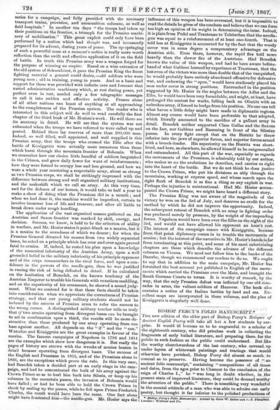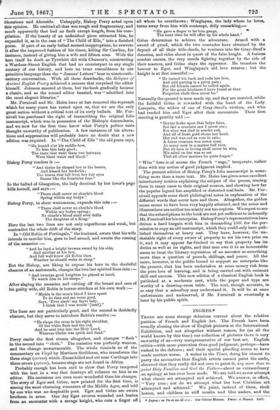BISHOP :PERCY'S FOLIO MANUSCRIPT.*
THE new edition of the older part of Bishop Percy's Reliques of ' Ancient English Poetry will take all but a few students by sur- prise. It would ill become us to be ungrateful...to a scholar of the eighteenth century, who did priceless work in collecting the fragments of early ballad literature, and preparing them for the public in such fashion as the public could understand. But like the worthy churchwardens of the last century, who covered up under layers of whitewash paintings and tracings that would otherwise have perished, Bishop Percy did almost as much to conceal as to preserve. Having become the possessor of "an ancient folio manuscript," containing "compositions of all times and dates, from the ages prior to Chaucer to the conclusion of the reign of Charles I.," he "was long in doubt whether, in the present state of improved literature, they could be deemed worthy the attention of the public." There is something very wonderful in the mental attitude of a man who was able to admire our early poetry, but thought it far inferior to the polished productions of
13ishop Percy's Folio Manuscript. _Edited by Jobo W. Helen and 1. J. FarniYaIL London: Trbbner and Co.
Shenstone and Akenside. Unhappily, Bishop Percy acted upon this opinion. He omitted all that was rough and fragmentary, and much apparently that had no fault except length, from his com- pilation. If the beauty of an unfinished piece attracted him, he
expanded it, as in the case of "The Child of Elle," into a finished poem. If part of an early ballad seemed inappropriate, he rewrote
it after the improved fashion of his times, killing Sir Cawline, for instance, instead of giving him a wife and fifteen sons. With the text itself he dealt as Tyrwhitt did with Chaucer's, constructing a Wardour-Street English that had no counterpart in any single
century of our history, and bore no truer resemblance to our primitive language than the " Jeames' Letters" bear to nineteenth- century conversation. With all these drawbacks, the Religues of Ancient English Poetry achieved a success that surprised the editor himself. Johnson sneered at them, but the book gradually became
a classic, and as the second editor boasted, was "admitted into the most elegant libraries."
Mr. Furnivall and Mr. Hales have at last removed the reproach which for many years has rested upon us, that we are the only great nation without a critical text of its early ballads. Mr. Fur- nivall has purchased the right of transcribing the original folio manuscript, which was in possession of the Bishop's descendants, and we now for the first time know what Percy's politer taste thought unworthy of publication. A few instances of his altera- tions and suppressions will probably leave no doubt that a new edition was required. In "The Child of Elle "the old poem says, "He leaned o'er his saddle-bow, To kiss this lady good ; The tears that went them two between Were blent water and blood."
Bishop Percy renders it :— " And thrice he clasped her to his breste, And kissed her tenderlie ;
The teares that fell from her fair eyes Ranne like the fountains free."
In the ballad of Glasgerion, the lady deceived by her lover's page kills herself, and says :- "There shall never no churle's blood Spring within my bodye."
Bishop Percy, in sheer wantonness, expands this into :— "There shall never no churle's blood Within my bodye spring;
No churle's blood shall ever defile The daughter of a King."
Here the last two lines are not only superfluous and weak, but contradict the whole drift of the story.
In "Old Robin of Portingale," the husband, aware that his wife intends to murder him, goes to bed armed, and awaits the coming of the assassins :-
"And he layd a bright browns sword by his side,
And another at his feet, And fall well knew old Robin then Whether he should wake or sleep."
But the Bishop, not liking to expose his hero to the doubtful chances of an ambuscade, changes the two last spirited lines into :—
" And twentye good knightes he placed at hand, To watch him in his sleepe."
After slaying the assassins and cutting off the breast and ears of his guilty wife, old Robin is horror-stricken at his own work :—
"Mickle is the man's blood I have spent To do thee and me some good, Says, 'Ever slack! my fayre lady,
I think that I was woods' [mad]."
The lines are not particularly good, and the second is decidedly obscure, but they serve to introduce Robin's resolve :—
" He shops the cross in his right shoulder, Of the white flesh and the red,
And he sent him into the Holy Land, Whereas Christ was quick and dead."
Percy omits the first stanza altogether, and changes " flesh " in the second into "cloth." The omission was perfectly wanton, and the change unwarrantable. The whole reminds us of the
commentary on Virgil by Martinus Scriblerus, who transforms the three stags (cervos) which "Eneas killed and eat near Carthage into three crows (corvos), because stags arenot found in Africa.
Probably enough has been said to show that Percy tampered with the text in a way that destroys all reliance on him as an editor. His omissions are even more wonderful than his changes. The story of Eger and Grine, now printed for the first time, is among the most charming romances of the Middle Ages, and told by one who was no despicable poet. Eger and Grine are sworn brethren in arms. One day Eger returns wounded and beaten from an encounter with a savage knight, who cuts a finger off all whom he overthrows ; Winglayne, the lady whom he loves, turns away from him with contempt, drily remarking,—
" He gave a finger to let him gauge, e■
The next time he will offer up his whole hand."
Grine determines to achieve the adventure. Armed with a sword of proof, which the two comrades have obtained by the deposit of all their title-deeds, he ventures into Sir Gray-Steel's domains, and rides about in quest of the false knight. A furious combat ensues, the very steeds fighting together by the aide of their masters, and Grine slays the oppressor. He transfers the honour to Eger; and Winglayne's old love returns ; but the knight is at first resentful :—
" He turned his back and rode her f roe, And said parting is a privy pain ;
But old friends cannot be called again.
For the great kindness I have found at thee Forgotten shalt thou never be."
Naturally the quarrel is soon made up, and they are married, while the faithful Grine is rewarded with the hand of the Lady Losepain, the widow of one of Gray-Steel's victims, and who. had tended him and Eger after their encounters. Their first meeting is prettily told :—
" Gryme looks upon that ladye faire,
Soe fair a creature saw I never are; For shee was clad in scarlet red, And all of fresh gold shone her head.
Her rud was red as rose in rain;
A fairer creature was never seen.
As many men in a matter full nice, But all men in loving shall never be wise, His mind on her was so set That ill other matters he quite forget."
" Wise " here is of course the French "sage," temperate, rather than with any notion of good judgment implied.
The present edition of Bishop Percy's folio manuscript is some- thing more than a mere text. Mr. Hales has given some excellent introductory notices explaining the subject of the poems, tracing: them in many cases to their original sources, and showing how far the popular legend has amplified or distorted real facts. Mr. Fur- nivall appends some short philological notes in explanation of the different words that occur here and there. Altogether, the golden mean seems to have been very happily attained, and the notes am& illustrations are neither too scanty nor too copious. We regret to see- that the subscriptions to the book are not yet sufficient to indemnify Mr. Furnivall for his enterprise. Bishop Percy's representatives have driven a hard bargain with him in demanding 150/. for the per- mission to copy an old manuscript, which they could only have pub- lished themselves at heavy cost. They have, however, the un- deniable right of every owner of property to set his own price oi. it, and it may appear far-fetched to say that property has it& duties as well as its rights, and that men owe it to an honourable name to treat the literary reputation of an ancestor as something more than a question of pounds, shillings, and pence. All the more, however, is the public bound to support an enterprise like- the present, that has been undertaken at some money risk frons
the pure love of learning, and is being carried out with eminent. skill and success. This new edition of a classical English book is published at a moderate cost, while the paper and type are- worthy of a drawing-room table. The text, though accurate, is. so easy that a schoolboy may understand it. It will be at once unfortunate and undeserved, if Mr. Furnivall is eventually a loser by his public spirit.































 Previous page
Previous page